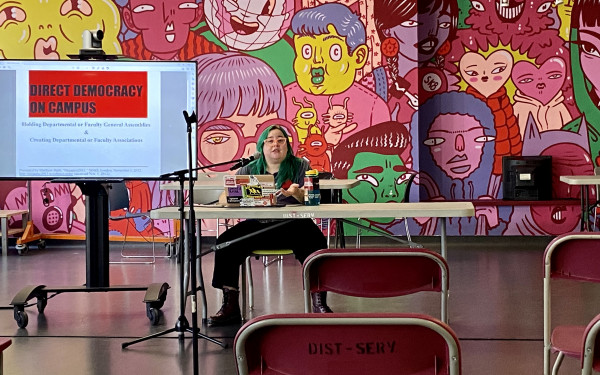Bigger is Better: This is About More Than Just Tuition
The upcoming student general strike against the $1,625 tuition fee hike in Quebec should be taken seriously by anyone who wants to win this fight.
The Liberal government will ignore students unless its power or legitimacy is seriously threatened, and a sustained general student strike can effectively challenge the government.
More importantly, the student movement should not limit its actions and analysis to tuition, as some have recently suggested.
After a very successful protest on Feb. 2, The Link quoted former Concordia Student Union councillor Tomer Shavit, who said, “Any other cause that is affixed to the tuition fight can lead to divisiveness and so should be treated with caution.”
This kind of flawed thinking raises two important issues.
First, of course, the student movement is about more than tuition. Even supposing that the fight is limited to the cost of education, this still raises serious questions about poverty and inequality. After all, those in financial difficulty are under the greatest threat from these hikes.
A government-issued report estimates that university enrolment will drop by 2.5 per cent, meaning that thousands of people in financial hardship will be denied their right to a university education. So this is not simply a fight about tuition fees. It is a fight for social equality against very powerful interests.
Second, it is wrong to believe that broadening the student movement beyond tuition will divide the movement and harm the fight against tuition hikes. Quite the opposite is true. The success of the movement may hinge on its ability to broaden the struggle.
To give a clear example, the Nov. 10 Day of Action protest last year was successful precisely because other factional divisions were overcome in a spirit of friendship and solidarity.
Environmental groups, anti-war activists, healthcare workers and teachers were on the streets in solidarity with the students. These links are deepening with time. In other words, a genuine social movement may be emerging.
There remains some hope that the upcoming student general strike across Quebec will trigger a broader mass movement in the province. Union activists in Quebec have been working in this direction, but they remain weak and on the defensive against continuing layoffs.
The upcoming provincial budget may be the trigger that sparks a broader movement, so we can assume that the Liberals will be treading lightly with this budget. The Occupy movement also remains a wildcard for this spring.
The point is that levels of solidarity are deepening amidst all this chaos, debate and division, and the student movement urgently needs to do the opposite of what Shavit suggests.
Remaining narrowly focused on our particular struggle is more divisive than deepening links with other causes and movements. We need to step outside of our institutions to create stronger levels of solidarity with a spectrum of groups that support the fight for accessible or free education.
Above all, it is critically important to recognize that all of these struggles are connected.
This is ultimately about an economic and political system that increasingly favours the rich, and students need to start fighting back against the rich if we are to have any meaningful impact.
Frank Lévesque-Nicol, the spokesperson for the Feb. 2 protest, said, “More and more people are starting to realize that the real problem behind the rising tuition fees and the commodification of education is something related to a socioeconomic system that is behind it all.”
And with the ever-increasing gap between the economically elite and the rest of us, that seems all the more accurate.
Simply looking at existing policies, it is clear that the Liberal government cares more about bankers and multinational mining companies in Quebec than it cares about its indigenous people and the swelling ranks of the working poor.
Remember that the impending $1,625 tuition hikes were introduced in the 2010 budget, which aims to kill the “sacred cows” of Quebec—accessible education and healthcare—to use the words of Liberal finance minister Raymond Bachand.
The government itself is heavily influenced by corporate powers that support the existing order. Bachand received a warm welcome when introducing his budget to select corporate leaders at a luncheon organized by the Board of Trade of Metropolitan Montreal in April of 2010.
He took the opportunity to stress that corporate income taxes will remain untouched. On the same day, tens of thousands of people were protesting against the budget in the middle of Montreal’s financial district.
Why was Bachand with the small cadre of corporate elites rather than on the streets with the voting masses? This gives a very clear picture of who this government works for. Bachand and the Charest Liberals are siding with the rich minority instead of the struggling majority.
Looked at in this way, this tuition fight is ultimately a struggle between competing classes, and it is clear which class is winning. The only way to turn the tide is to bring the fight to the Liberal doorstep, and to the doorsteps of the bankers and corporate CEOs that exert incredible influence in support of these hikes and cuts to social programs.
As geographer David Harvey at Occupy London said, “We need to mobilize in such a way that we can genuinely threaten major commercial and financial interests.”
That might make some uncomfortable, but this is the predicament we are in. The statistics are plain for all to see and not worth repeating here, but over the past few decades, the rich have been increasingly threatening the wellbeing of the poor and working classes while they amass record profits.
Students, the poor and working people have been under attack by commercial and financial interests for too long. It’s time that we seriously fight back.




_600_375_s_c1.png)


